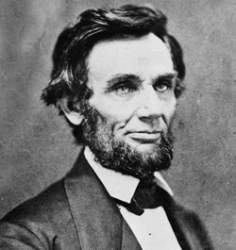Record Data
Transcription
Speech at Pittsburgh, Pennsylvania
February 15, 1861
Mayor Wilson and Citizens of Pennsylvania: I most cordially thank his Honor Mayor Wilson, and the citizens of Pittsburg generally for this flattering reception. It is the more grateful, because I know that, while it is not given to me alone, but to the cause which I represent, yet it is given under circumstances which clearly prove to me that there is good will and sincere feeling at the bottom of it.
And here, fellow citizens, I may remark that in every short address I have made to the people, and in every crowd through which I have passed of late, some allusion has been made to the present distracted condition of the country. It is naturally expected that I should say something upon this subject, but to touch upon it all would involve an elaborate discussion of a great many questions and circumstances, would require more time than I can at present command, and would perhaps unnecessarily commit me upon matters which have not yet fully developed themselves. [Immense cheering, and cries of ``good!'' ``that's right!'']
The condition of the country, fellow-citizens, is an extraordinary one, and fills the mind of every patriot with anxiety and solicitude. My intention is to give this subject all the consideration which I possibly can before I speak fully and definitely in regard to it---so that, when I do speak, I may be as nearly right as possible. And when I do speak, fellow-citizens, I hope to say nothing in opposition to the spirit of the Consititution, contrary to the integrity of the Union, or which will in any way prove inimical to the liberties of the people or to the peace of the whole country. And, furthermore, when the time arrives for me to speak on this great subject, I hope to say nothing which will disappoint the reasonable expectations of any man, or disappoint the people generally throughout the country, especially if their expectations have been based upon anything which I may have heretofore said.
Notwithstanding the troubles across the river, [the speaker pointing southwardly, and smiling] there is really no crisis, springing from anything in the government itself. In plain words, there is really no crisis except an artificial one! What is there now to warrant the condition of affairs presented by our friends ``over the river?'' Take even their own view of the questions involved, and there is nothing to justify the course which they are pursuing. I repeat it, then---there is no crisis, excepting such a one as may be gotten up at any time by designing politicians. My advice, then, under such circumstances, is to keep cool. If the great American people will only keep their temper, on both sides of the line, the troubles will come to an end, and the question which now distracts the country will be settled just as surely as all other difficulties of like character which have originated in this government have been adjusted. Let the people on both sides keep their self-possession, and just as other clouds have cleared away in due time, so will this, and this great nation shall continue to prosper as heretofore. But, fellow citizens, I have spoken longer on this subject than I had intended in the outset---and I shall say no more at present.
Fellow citizens, as this is the first opportunity which I have had to address a Pennsylvania assemblage, it seems a fitting time to indulge in a few remarks upon the important question of a tariff---a subject of great magnitude, and one which is attended with many difficulties, owing to the great variety of interests which it involves. So long as direct taxation for the support of government is not resorted to, a tariff is necessary. The tariff is to the government what a meal is to the family; but, while this is admitted, it still becomes necessary to modify and change its operations according to new interests and new circumstances. So far there is little difference of opinion among politicians, but the question as to how far imposts may be adjusted for the protection of home industry, gives rise to various views and objections. I must confess that I do not understand this subject in all its multiform bearings, but I promise you that I will give it my closest attention, and endeavor to comprehend it more fully. And here I may remark that the Chicago platform contains a plank upon this subject, which I think should be regarded as law for the incoming administration. In fact, this question, as well as all other subjects embodied in that platform, should not be varied from what we gave the people to understand would be our policy when we obtained their votes. Permit me, fellow citizens, to read the tariff plank of the Chicago platform, or rather, to have it read in your hearing by one who has younger eyes than I have...
But I am trespassing upon your patience---[cries of ``no!'' ``no!'' ``Go on---we'll listen!''] and must bring my remarks to a close. Thanking you most cordially for the kind reception which you have extended me, I bid you all adieu. [Enthusiastic applause.]


